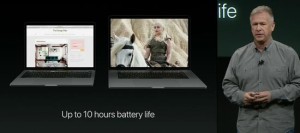The Root Cause of Short Battery Life of New MacBook Pro Has Finally Been Spotted
On December 22nd, 2016, American Consumer Reports claimed that latest Apple MacBook Pro failed to get its recommendation for the battery problem; Later, Apple said it would cooperate with Consumer Reports, in order to find out what is wrong with the New MacBook Pro.
The question now finally has an answer.
A Bug of Safari
According to news released by Consumer Reports in last December, New MacBook Pro did well in aspects like the screen display effect etc., but its battery life varied too much; For example, battery life results of 13 inch MacBook Pro with Touch Bar in three consecutive tests were 16 hours, 12.75 hours, and 12.75 hours, and it showed a gap of nearly five times from start to finish.
For this, 2016 New MacBook Pro becomes the first MacBook of not being recommended by Consumer Reports in the history.
Concerning this, Apple said Consumer Reports closed local cache of Safari browser when testing new MacBook, causing Safari needed to get the content every time accessing a web site. If it was open, Safari could keep cache in local hard disk, and did not need to reload each time.
Apple said in its statement that:
Consumer Reports closed the browser cache in test, but this function is mainly for web developers, and is hidden by default. Consumers won’t apply this setting in routine situations, so it cannot effectively reflect usage in real cases.
In addition to this Setting, Apple also found that the test conditions of Consumer Reports triggered a Safari bug, it would affect icon acquisition process of the browser; But Apple has fixed the bug, and this action should be positive on battery life for the New MacBook Pro.
Apple has posted a solution for this bug on its official website, and users who have already registered Apple testing software program can take the lead in using it. But Apple said it will take the solution into a larger software updates in future, and push to all the MacBook Pro users in the next few weeks.
Why close Safari cache?
Although the problem is found, test way of Consumer Reports may arouse a question: Knowing it will affect the battery life, why close Safari browser cache in the test? Could it be Consumer Reports intentionally throws mud at Apple?
Consumer Reports also gives a clear response for this.
It says, since the ways consumers use a laptop are too diverse, the test itself does not reflect user experience of a single consumer. On the contrary, the whole test process controls variables, thus generating a result in line with the average user expectations.
And in the process of power test, the laptop battery is charged to 100%, and then repeatedly open 10 different web pages in the default browser until the battery runs out of electricity. The variables Consumer Reports controls include shutting down auto- screen dimming, ensuring screen brightness, and closing local cache, etc.

Working principle of the local browser cache
Consumer Reports emphasized, object-oriented of these variables control is all laptops, rather than specific to the New MacBook Pro; That is to say, problem found last time is exactly this bug from Safari. When Consumer Reports opens local cache, battery life of these apple devices is much longer.
Consumer Reports is in a new battery test for the New MacBook Pro, and decided to update its evaluation after finishing the test.
Apple’s response to this is:
New MacBook Pro is the best Pro laptop we have created so far. We respect consumer reports, and are very much delighted with the decision it made.

